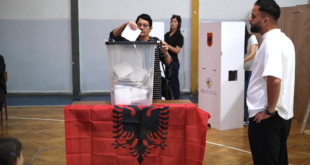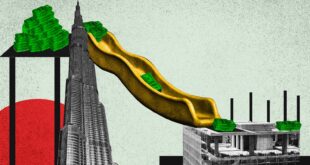By IsaIntel
A fourth protester has died as a result of a gunshot wound during 21 January protest rallies outside the Albanian Prime Minister’s Office, bringing the death toll to four. At the same time, protesters, led by Socialist Party leader Edi Rama, have vowed to stage another round of demonstrations this Friday, and continue until the government is forced out.
EU foreign policy chief Catherine Ashton’s envoy, Miroslav Lajcak, has reminded Albanian political leaders of their “shared responsibility for preventing any further violence and bloodshed, the functioning of state institutions and respecting state institutions. No one is above the state institutions.”
After meeting with Albanian political figures last week, Lajcak told reporters: “I made it clear that the European future for Albania depends very much on whether the political leaders choose to do what we ask them to do, and do it now. […]“it is now up to your politicians to make the first move in the right direction. They know exactly what we want them to do.”
There are three main questions here that warrant detailed examination: 1) Will the situation continue to gain in intensity and violence? 2) What will this mean for the wider region? 3) How will this affect Albania’s NATO and EU aspirations?
With No Peaceful Solution in Sight and Neither Side Willing to Back Down, the Situation Threatens to Spiral Out of Control
Prime Minister Sali Berisha is not seeking a peaceful solution to the crisis and is treating the situation in the typical style of Albanian politics – score-settling. He is further fomenting the crisis through the creation of a parliamentary committee charged with investigating what he is calling a coup attempt, led by Rama, rather than investigating why it was that National Guards opened fire on protesters armed with rocks and sticks outside the Prime Minister’s Office. Berisha is also directly attacking the General Prosecutor’s Office, which has failed to come out on his side in the crisis by ordering the arrest of six National Guardsmen involved in the 21 January deaths – arrests that the police have refused to carry out.
Berisha has also threatened to arrest Rama should more protests be staged. Rama has also shown no sign of backing down, threatening to continue the protests until the government is brought down.
Albania’s current political crisis is less about policy than it is about personality, as it has traditionally been since the days of dictator Enver Hoxha. This specific crisis takes its roots in the last elections in 2009, which the opposition says were fraudulent and which Berisha’s ruling party won by a narrow margin. High unemployment and the effects of the economic crisis have also played a role.
Albania’s EU Aspirations Will Become Hostage to a Revival of Political Violence and Pervasive Corruption
Indeed, especially to other countries in the region, it seems a miracle that Albania has progressed along the road of EU integration as much as it has in recent years. But this is largely due to EU perception rather than to the facts on the ground. Until the 2009 elections, there was a period of relative stability and efforts on the part of Tirana to forge relations with the wider region. But it was only a temporary reprieve. Elections have always fallen short of any real democratic process, and they tend to represent personal battles between high-profile figures who use the polls to stack the deck against their opponents and to forge lucrative relations with dubious, influential private figures. Institutions are largely ineffective, and as we see now, the battle is on to see who can control the prosecutor’s office, for instance. Corruption has remained endemic and media freedom horrendous. Freedom House, for instance, ranks Albania along with Abkhazia and Gambia as only “partly free”. Transparency International ranks Albania 95th out of 180 and anyone tied to Berisha can consider themselves immune from prosecution.
In short, Albania is not even close to being EU material, and other EU aspirants in the region are watching the situation closely to see how the EU will respond. Certainly, Croatia will be wondering why, in comparison to Albania, it hasn’t been granted EU membership long ago.
Albania, along with Bosnia-Herzegovina, was granted EU visa liberalization just in December, behind other countries of the region (with the exception of Kosovo). Not a month has passed, and EU member states, already hesitant about the move, are likely viewing this as a mistake in light of the violence in Albania. An earlier round of visa liberalization for Serbia, Montenegro and Macedonia produced grim results: large numbers of asylum seekers showed up on Europe’s doorstep and some EU member states almost balked at offering the same deal to Bosnia and Albania. And visa liberalization is not set in stone. It will be reviewed every six months for each country to determine whether the rules and regulations are being met properly. Albania now risks having this revoked. Indeed, an increase in tensions and political violence could lead to an increase in asylum seekers to the EU from Albania. Just as the results from visa liberalization in Serbia, Macedonia and Montenegro threatened to affect the same deal for Bosnia and Albania, now the situation in Albania could have negative consequences for the EU’s visa liberalization policy for the entire region.
It could also have negative consequences for further EU enlargement in the region. The EU is now focusing more on regional policies for enlargement than on individual country aspirations. Brussels views it important (rightly so) that the countries of the region join as a regional bloc, having renewed the market, political, social and cultural ties they shared before the breakup of Yugoslavia.
Indeed, the EU has put a lot on money into this idea, among other things providing billions in funding under the Instrument for Pre-Accession Assistance (IPA) to create cross-border projects aimed at bringing partners from Western Balkan countries together to jointly develop the region’s natural and human resources. Its investment in Albania will have been for naught if the political crisis spirals out of control, and as such will also affect its regional partners.
Clearly, urgent EU-required legislation will not be passed by an Albanian parliament that is divided and by political parties who refuse any high-level contact with each other.
Last year, the European Commission rejected Albania’s application for official candidate member status, citing democratic weakness, a poorly performing judiciary and high-level corruption and organized crime.
The recent violence threatens to put Albania on the level with Kosovo in terms of EU integration, with Bosnia also remaining a major question mark (though with no real threat of violence), and the EU is not keen to have only part of the region in its fold for a number of reasons, both political and economic. The violence in Albania could also result in yet another EU rethink of enlargement, as did the acceptance of Bulgaria and Romania into the bloc, which many EU member states now think was premature. The standards have been raised, hence leaving Croatia on the sidelines, at least for now, and this could happen once again. The region is now key, rather than individual states, and Albania could prove a major setback.
If the EU hopes to salvage the situation, it will have to get its hands dirty in Albania, much like it will have to take over the Office of the High Representative in Bosnia. There is no room for traditional Albanian politics in the EU, and only a hands-on approach will keep Albania from destroying regional EU aspirations.
Bad News for NATO Members
Certainly, the violence in Albania will have an effect on NATO. Albania joined the Alliance in April 2009, along with Croatia. Since 1992, when Albania began the NATO accession process, it has been viewed as a stability factor, largely because of the situation in the rest of the Western Balkans during the wars following the breakup of Yugoslavia. Again, this was a comparative outlook based more on what was happening around Albania than on what was happening inside Albania itself.
In March 1999, as a result of the Kosovo conflict, NATO established a logistics support command in Albania to facilitate Kosovo Force (KFOR) operations. In June 2002, the NATO Headquarters Tirana (NHQT) was established to “assist and support the government of Albania in an advisory role in relation to NATO membership activities.”
Albanian troops participate in the Southeast European Brigade (SEEBRIG) created in 1998, along with Bulgaria, Croatia, Macedonia, Greece, Italy, Slovenia, Romania, Turkey and the United States. They also participate in Mission Althea in Bosnia-Herzegovina, and NATO’s ISAF mission in Afghanistan. Previously, Albanian troops were in Iraq, though Tirana withdrew forces in December 2008. Albania also participates in the EU’s mission in Chad and NATO’s Active Endeavour operation in the Mediterranean.
The situation is most likely to have the greatest impact on Macedonian and Bosnian NATO membership. Macedonia, which has its own ethnic-Albanian population, could be drawn into the Albanian political crisis and further hinder its long-awaited NATO membership, coupling this crisis with the ongoing dispute with neighboring Greece over the former’s official name. Greece could also be expected to use the Albanian political crisis so close to Macedonia as another reason to keep Macedonia from joining the Alliance.
NATO could also rethink its membership roster in light of the violence where it concerns Bosnia’s pending NATO membership. Even without the Albanian crisis, Bosnia has progressed at a snail’s pace towards NATO membership, with its largely ineffective state parliament (and now the failure to form a new government following 3 October 2010 elections) incapable of pushing through any major reforms necessary for joining the Alliance. If the situation in Albania causes a rethink of NATO enlargement, Bosnia will be one of the first to suffer.
Regional Political Fallout?
Aside from the NATO and EU factors, there could be regional political fallout in Macedonia and Kosovo, though not likely in Bosnia, Serbia, Montenegro or Croatia, where the political culture is so different from that in Albania that there is generally not much in the way of direct reverberations. Rama is likely taking, in part, cue from the spate of mass protests in the Middle East to get his own supporters on to the streets in larger and more serious numbers. The Albanian political cultural, which largely resembles score-settling, is vastly different from the political culture in other countries of the region (Kosovo being the exception), and they do not share the same political histories or legacies since the breakup of Yugoslavia. Kosovo’s authorities will sit back and wait to see, for now, what develops in Albania, its key supporter, but will keep its eye on lucrative EU support, which it needs in order to survive in the region as an independent state. Here it will be interesting to see how Kosovo’s Prime Minister Hashim Thaci responds, as Berisha is close ally of his. (Thaci is under close scrutiny now for his alleged involvement in organized crime. Western support for him has also come under scrutiny given the release of recent confidential communications showing that Western officials were aware of his criminal activities for years and chose to support him anyway. )
Certainly, the governing coalition in Macedonia is concerned about any possible spillover effects, and while Prime Minister Nikolai Gruevski has said that he did not expect a direct spillover, opposition forces are attempting to use the situation in Albania to put pressure on the ruling government. Local media have quoted opposition forces from the SDSM as saying that Macedonia is not immune to a political crisis similar to the Albanian one because of the grave economic situation. Indeed, the opposition has said it would support protests, and there is enough mass discontent at the moment to provoke such a situation. Macedonia’s A1 television has been at the forefront of such a movement, attempting to gain public support for its campaign against “dictatorship”.
Mass protests in Serbia over the weekend are in no way related to the unrest in Albania, but to the general economic situation.
–by Jen Alic for ISA Intel
 Eurasia Press & News
Eurasia Press & News


